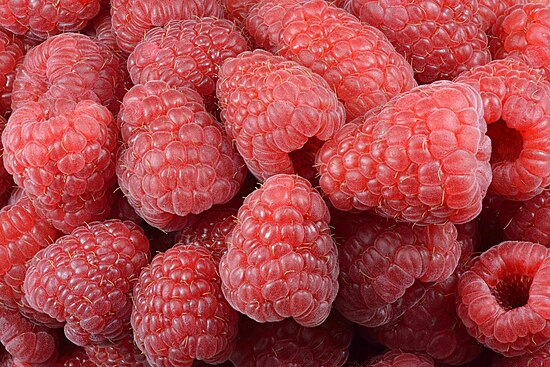Talk:Raspberry
| This is the talk page for discussing improvements to the Raspberry article. This is not a forum for general discussion of the article's subject. |
Article policies
|
| Find sources: Google (books · news · scholar · free images · WP refs) · FENS · JSTOR · TWL |
| Archives: 1Auto-archiving period: 3 months |
| This It is of interest to the following WikiProjects: | ||||||||||||||||||||||||||||
| ||||||||||||||||||||||||||||
There is a request, submitted by Catfurball, for an audio version of this article to be created. For further information, see WikiProject Spoken Wikipedia. The rationale behind the request is: "Important". |
Fibre per day
The British Heart Foundation recommend 30g for females and males. The statement that females should have less might be dangerously misleading. Physical size and work now being more equal. [1]https://www.bhf.org.uk/informationsupport/heart-matters-magazine/nutrition/fibre#:~:text=How%20much%20fibre%20should%20I,are%20rich%20in%20fibre%20too. 2A00:23C5:9E8E:3801:5874:DC26:9D8C:18B9 (talk) 23:10, 2 December 2023 (UTC)
- Dietary fiber comparisons among various foods is offtopic for this article. I removed the "comparison" table as having low relevance and inadequate sourcing. Zefr (talk) 01:19, 3 December 2023 (UTC)
Featured picture scheduled for POTD
Hello! This is to let editors know that File:Raspberries (Rubus_idaeus).jpg, a featured picture used in this article, has been selected as the English Wikipedia's picture of the day (POTD) for December 14, 2023. A preview of the POTD is displayed below and can be edited at Template:POTD/2023-12-14. For the greater benefit of readers, any potential improvements or maintenance that could benefit the quality of this article should be done before its scheduled appearance on the Main Page. If you have any concerns, please place a message at Wikipedia talk:Picture of the day. Thank you! — Amakuru (talk) 23:54, 6 December 2023 (UTC)
- Amakuru - please remove or rewrite the misinformation in the last sentence of the image caption: nutrient content for raspberries is provided in the USDA table already in the article as an expert source; raspberries contain negligible iron (see table), and the only dietary 'antioxidant' present is vitamin C. No WP:MEDRS sources and no national regulatory agency states that raspberries are rich in unnamed 'antioxidants' other than vitamin C. Only vitamins A-C-E are dietary antioxidants; other raspberry compounds like polyphenols are not nutrients but are only phytochemicals with unknown in vivo effects. Zefr (talk) 00:11, 7 December 2023 (UTC)

|
|
The raspberry is the edible fruit of a multitude of plant species in the genus Rubus of the rose family, most of which are in the subgenus Idaeobatus. The name also applies to the plant itself. Raspberry plants are perennial with woody stems. It is an aggregate fruit, developing from the numerous distinct carpels of a single flower. Originally occurring in East Asia, the raspberry is now cultivated across northern Europe and North America and is eaten in a variety of ways including as a whole fruit and in preserves, cakes, ice cream and liqueurs. Raspberries are a rich source of vitamin C, manganese, and dietary fiber. Photograph credit: Ivar Leidus
Recently featured:
|
Production table
Per MOS:ACCESS#FLOAT, floating elements should be placed inside the section they belong to; do not place the image at the end of the previous section. Consequently I have moved the production table into the production section.
This has the disadvantage of creating a tall thin table with 13 lines of text in desktop mode to display just 6 rows of data in a short 1-paragraph section which stacks it into the table in the next section. I attempted to alleviate this with these changes which were reverted by @Zefr
- Moving the source text completely into a footnote and the footnote into the header. (-2 line)
- Changing width:14em to whitespace:nowrap. (-2 lines)
- Moving the units from the headers into each row. (-1 line)
- Eliminating the column headers. It is obvious that one column is the country and the other is amount produced. (-1 line)
- Right aligning the table cells so the units were aligned. In retrospect, I should have kept the countries left aligned so the flags lined up.
- Adding {{clear}} at the end to prevent table stacking. In retrospect, I think this was a mistake.
The result is a table that is half the height and only slightly wider but still ok on narrow screens. I propose to restore #1-#4 and a revised #5. I am open to other suggestions on how to improve this table’s appearance in the article, eg, by adjusting or eliminating any of these. — YBG (talk) 21:05, 7 July 2024 (UTC)
- C-Class level-4 vital articles
- Wikipedia level-4 vital articles in Biology and health sciences
- C-Class vital articles in Biology and health sciences
- C-Class plant articles
- High-importance plant articles
- WikiProject Plants articles
- C-Class Food and drink articles
- High-importance Food and drink articles
- WikiProject Food and drink articles
- Spoken Wikipedia requests



